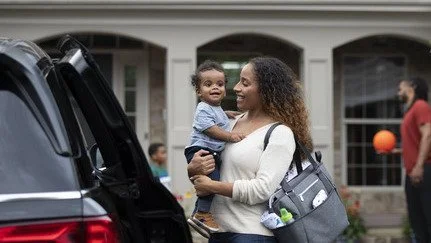Does Car Insurance Follow the Car or the Driver?
In general, automobile insurance will follow the car listed on the policy. There are some instances where insurance will cover the driver, like when renting a vehicle for personal use. Discover the circumstances around insurance coverage and the situations in which insurance covers the car or the driver.
Your automobile insurance will cover your covered auto that is driven by you, a household family member, or by a licensed driver who has your (express or implied) permission to use your auto. For example, your friend borrows your car for a day with your permission. Exclusions may exist if the vehicle is rented or leased to others; for certain business uses; carrying people or property for a fee/compensation; if the person has a disabled license; or when used in a vehicle-sharing program. Other exclusions or state variations may apply so refer to your policy contract or speak with your agent.
When car insurance follows the car
Generally, liability insurance follows the car listed on the policy. If a licensed driver borrows your car with your permission, they’re covered under what is known as permissive use. That means if they get into an accident while driving your car, your car insurance will cover the damage as though you were driving.
Generally, if the driver who borrowed your car causes an accident and is found legally liable, your liability coverage will generally pay for the damage or injury caused to someone else. Your collision coverage would generally pay for the damage to your own vehicle if they struck another vehicle or object.
Liability coverage
Liability insurance provides protection for damages caused by the liable party. If the driver of your vehicle causes an accident and another party is injured or sustains property damage, bodily injury liability coverage can help pay their medical bills and loss of income, while property damage liability coverage helps pay for damages to another person’s vehicle or property up to the policy limit. In addition, liability insurance covers defense costs incurred following an accident. Note: exclusions apply.
Collision and comprehensive coverage
Before we dive into questions like, “does my car insurance cover other drivers?” or “does my car insurance cover me in another car?” it’s important to understand the two main types of coverage – collision and comprehensive coverage.
The difference between collision insurance and comprehensive insurance comes down to how your car was damaged. Regardless of who’s at fault, collision coverage can pay for damage to your vehicle if you hit another vehicle or object; another vehicle hits you; or your vehicle rolls over. Comprehensive coverage, also known as “other than collision,” can help pay for damage to your vehicle from vandalism, theft, weather events and accidents involving animals.
Let’s look at the differences in real-world applications. If you hit another car or a stationary object like a pole, the damage to your vehicle would be covered by collision coverage. If your car hits or is hit by a deer or a non-stationary object like a falling tree or sign, or it’s damaged by vandalism, fire, or other natural disasters, then comprehensive coverage would cover the damages. Note: Exclusions apply.
Coverage applies for damage to your vehicle only if damage is done by a permissive driver (exclusions apply).
When car insurance follows the driver
Car insurance generally follows the car and not the driver, but what about exceptions? One notable exception is if you rent a car for personal use. This means that if you have insurance on your own car, then you may want to consider whether you want to pay for insurance from the rental company.
Insurance coverage when renting or borrowing a car
Rental car insurance is offered through the car rental companies. Before you sign any rental car paperwork, call your auto insurance agent to ask if your insurance covers you for liability and damage to the rental vehicle. If you don’t have liability, comprehensive, and collision coverage on your personal vehicle, then your insurance won’t cover your rental car if you get in a collision or damage the rental car another way. If coverage applies from your auto policy, it will apply with the broadest coverage of any vehicle on your policy. Some state variations and exclusions may exist.
Another important factor to consider is the purpose of your trip. There are certain business uses that are excluded, and rented moving trucks or trailers may not be covered under comprehensive or collision coverage, or they may not offer enough coverage. Always check your insurance policy to ensure you have enough coverage before accepting or denying the rental car insurance.
Any non-owned vehicle must be operated by you or a household family member (not a permissive user), and it must not be available or furnished for your regular use or the household member operating it. Additionally, insurance provided to non-owned vehicles will generally be excess over any other collectible source (depending on the particular policy language).
Insurance coverage when renting a car
In lieu of your standard insurance, your rental company might offer you a variety of coverages. Be sure you understand your own personal coverage and its limitations, as well as what the rental company is offering before you accept or decline the rental car company insurance.
Insurance coverage when borrowing a car
If someone else drives your car with your permission and causes an accident, your insurance will most likely cover damages to other drivers or property along with damage to your own car depending on your policy.
If you don’t have comprehensive or collision coverage and a friend you gave permission to use your car damages it, your insurance will not cover the costs to repair your vehicle. Even if the person you gave permission to drive your vehicle has their own collision coverage, their policy may not cover damages to your vehicle.
As always though, coverage can vary based on the insurance company and the state you are in so be sure to ask your insurer what’s covered before handing over your keys.
Sometimes, specific portions of your friend’s insurance policy may apply to help cover costs when your limits are exceeded or if the damages aren’t covered by your policy, but this is state- or situation-dependent. This is like a backup policy. For example, if the borrower of your car causes more property damage than your insurance covers, their insurance might be used to pay the remainder of the claim.
Dan Zeiler
Dan@zeiler.com
877-597-5900 x134

